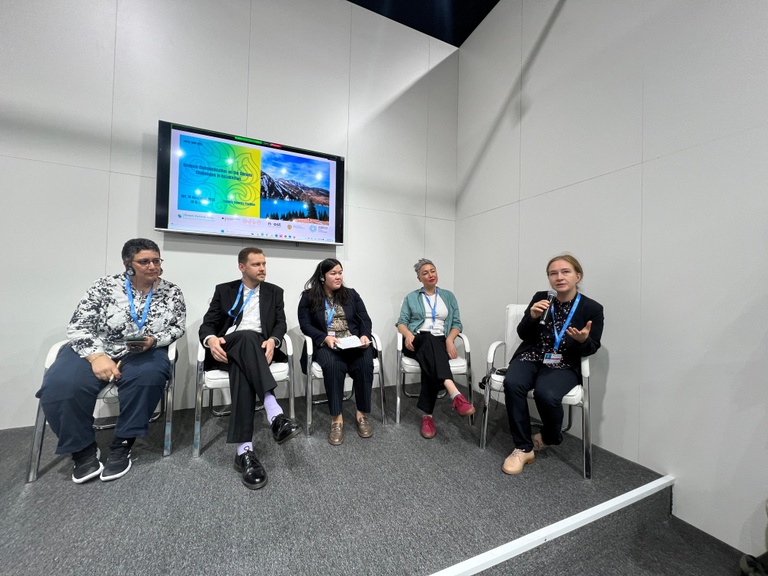
On the 16th of November, the Potsdam Institute for Climate Impact Research (PIK), N-OST and the Ministry of Ecology and Natural Resources of the Republic of Kazakhstan jointly facilitated a COP29 side event entitled: "Science Communication on the Climate Challenges in Kazakhstan". The two-hour session was held at the Kazakh Country Pavilion at Baku Olympic Stadium, Azerbaijan.
The side event highlighted the urgent need to raise awareness of climate impacts, particularly in the context of the devastating floods in Kazakhstan earlier this year. Experts, policymakers and journalist came together to address the pressing need for robust climate science communication.
The event was kicked off by a Memorandum of Understanding (MOU) handover ceremony between Prof. Dr. Ottmar Edenhofer, Director of the Potsdam Institute for Climate Impact Research and Mr. Mansur Oshurbaev, Vize Minister of the Ministry of Ecology and Natural Resources of the Republic of Kazakhstan. Both gave welcome words which highlighted the necessity to improving bi-directional knowledge transfer for improved science communication.
“It is a historic moment to exchange this MoU and to carry out this project: Avoiding dangerous climate change is the foundation of our future prosperity. This has to be communicated in a convincing way to the public, to the decision makers and to the stakeholders” states Director Edenhofer in his remarks.
The MOU handover ceremony was followed by inspiring opening remarks from the IPCC Vice-Chair Prof. Dr. Urge-Vorsatz.
PIK’s Stefanie Wesch and N-OSTs Anneke Hudalla jointly moderated the event, while PIK’s Dr Iulii Didovets gave a keynote linking Kazahstan´s recent flooding events to global climate trends. He underscored the importance of translating complex climate science into actionable knowledge for both policy makers and the public.

The subsequent expert panel, featured prominent voices in climate communication such as Dr. Aliya Wedelich (climate journalist and activist), Ms Saule Sabieva (Director of the Department of Climate Policy at the Ministry of Ecology and Natural Resources of the Republic of Kazakhstan), Dr. Babara Janusz-Pawletta (country representative International Water Management Institute), Dr. Sarra Touzi (senior water resources and climate change expert at Global Water Partnership) and Dr. Iulii Didovets (Potsdam Institute for Climate Impact Research). The lively fishbowl discussion explored how climate communication can effectively address the challenges of extreme events, such as the 2024 floods. Discussions focused on the role of journalists, researchers, and policymakers in ensuring that scientific findings reach relevant stakeholders, including the general public, in a timely and accessible manner.
As a result, important views from many perspectives and disciplines were provided on the critical issue of science communication in the field of climate change. The aim of the event was to increase the understanding of the importance of of science communication in addressing climate-induced disasters and to strengthen partnerships between Kazakh institutions and international research bodies. It serves as a step towards a collaborative framework for improving climate resilience through enhanced communication strategies between scientists, policymakers, and the media.





